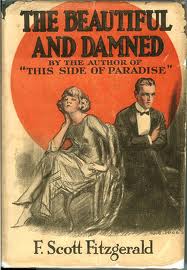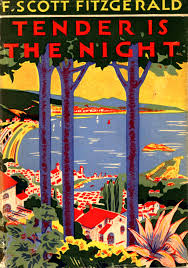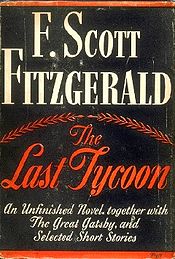Beyond The Great Gatsby: 3 More F. Scott Fitzgerald Books You Might Like

The Great Gatsby is without a doubt F. Scott Fitzgerald’s best known book. Baz Luhrmann’s recent adaptation only serves to cement this fact. However, it is not necessarily his best work. It can be argued, and has been in literary circles, that Gatsby does not feature Fitzgerald’s best writing. I would tend to agree. I was disappointed with The Great Gatsby and felt it did not live up to its reputation. This article aims to introduce readers to some of Fitzgerald’s lesser known, but equally as good novels. Furthermore it aims to show how and why these novels, although possibly better written, have not received the attention lavished on The Great Gatsby.
3. The Beautiful and the Damned
 Fitzgerald’s second book published in 1922 follows the life of nouveau-riche couple Anthony and Gloria Patch. The novel details the life of young bright things in the twenties, moving from party to party, as the Patch’s await his grandfather’s inheritance. They are deeply passionate about each other, about nice things, nice places and nice people. But they are not passionate about managing their money, and fall into a spiral of spending what they don’t have on things they don’t need (at one point, on the verge of destitution, Anthony spends $75 on a case of whisky). This financial bankruptcy is twinned with both character’s ‘emotional bankruptcy’. This is the idea that they should have as good a time as possible now, without a care for what happens after. This ‘Nietzscheanism’ highlights the general lethargy that is prevalent throughout the novel. Overall the tone of the novel is depressing, with little to give the reader genuine pleasure or happiness. However, this is what makes it such an important work. It infuses in the reader the want to succeed, to not fall has hard as Anthony and Gloria. It almost serves as a warning to not repeat the mistakes that play out in front of the reader. To have purpose in ones life.
Fitzgerald’s second book published in 1922 follows the life of nouveau-riche couple Anthony and Gloria Patch. The novel details the life of young bright things in the twenties, moving from party to party, as the Patch’s await his grandfather’s inheritance. They are deeply passionate about each other, about nice things, nice places and nice people. But they are not passionate about managing their money, and fall into a spiral of spending what they don’t have on things they don’t need (at one point, on the verge of destitution, Anthony spends $75 on a case of whisky). This financial bankruptcy is twinned with both character’s ‘emotional bankruptcy’. This is the idea that they should have as good a time as possible now, without a care for what happens after. This ‘Nietzscheanism’ highlights the general lethargy that is prevalent throughout the novel. Overall the tone of the novel is depressing, with little to give the reader genuine pleasure or happiness. However, this is what makes it such an important work. It infuses in the reader the want to succeed, to not fall has hard as Anthony and Gloria. It almost serves as a warning to not repeat the mistakes that play out in front of the reader. To have purpose in ones life.
The plot isn’t one of Fitzgerald’s best, but the beautifully crafted prose more than makes up for it. It is an account of Anthony Patch’s life; of his alcoholism (‘pour into themselves a gay and delicate poison’), his military service and his relationship with Gloria (‘They were stars on this stage, playing to an audience of two: the passion of their pretence created the actuality’). But it is also much more than that. It is a social history of the ‘Jazz Age’, where money was plentiful, drinks flowed and good times were there to be had.
There are some problems with the novel that I think hold it back from being as popular as The Great Gatsby. Firstly, the characters are not likeable. Anthony is lazy, uninspired, irrational and the worst part is that he knows this. He understands his inability to do anything constructive in his life and is in Gloria’s words an ‘utter coward’. Gloria is obsessed with all things beautiful, including herself and the thought of losing herbeauty frightens her. In comparison to Jay Gatsby, the characters have nowhere near as much allure. There is no mystery or intrigue. We know they are beautiful and we know they are destined for a fall. Therefore it is hard to connect with them. Wanting them to succeed is utterly futile.
The second problem is it’s ending. Despite Anthony and Gloria’s great fall, they end up, if not successful, then at least avoiding complete failure. They challenge the settlement of the will (as it originally ends up being left to his Grandfather’s secretary Shuttleworth) and win. The novel ends with them leaving New York on a boat bound for Italy with Anthony’s last words: ‘I showed them, it was a hard fight, but I didn’t give up and I came through’. This ending leaves the reader feeling a little cheated, as if the preceding fall had all been for nothing. They are never held accountable for their failures. Instead they are able to physically and metaphorically sail away from their troubles.
2. Tender is the Night
 Tender is the Night is Fitzgerald’s second best known novel and is set in the American expatriate community of Europe. Fitzgerald tells the story of the relationship between Dick Diver, a psychologist, and his patient and wife Nicole. Their extravagant lifestyle, based on family money, soon begins to unravel through a mix of laziness, alcoholism and Dick’s affair with a young American actress (Rosemary Hoyt).
Tender is the Night is Fitzgerald’s second best known novel and is set in the American expatriate community of Europe. Fitzgerald tells the story of the relationship between Dick Diver, a psychologist, and his patient and wife Nicole. Their extravagant lifestyle, based on family money, soon begins to unravel through a mix of laziness, alcoholism and Dick’s affair with a young American actress (Rosemary Hoyt).
Published in 1934 Tender is the Night met with little initial critical or commercial acclaim. And it is easy to understand why. Unlike the Great Gatsby, the plot is fairly slow with nothing really significant happening at the beginning of the novel. The overall plot isn’t as tight as Gatsby either, which is held together by the mystery of who Jay Gatsby really is. Tender is the Night is a harder read, that deals with complex human relationships that are not easily understood or dealt with. This however is the triumph of the novel, as we really do believe in the characters and their issues. Although Dick’s marriage to one of his patients is slightly absurd, the subsequent break up of their marriage is played out faultlessly by Fitzgerald. Dick Diver’s decline and fall is a spectacle to behold.
And it carries with it underlying questions on subjects such as the move to modernity, and the American Dream. Tender is the Night is much more than a simple decline story, it was an attempt at ‘social realism’ which aims to show a ‘densely actualised social, historical and geographical background’ against which the characters interactions play out. This is what gives the novel is credibility as the characters chronology, medical and scientific facts, and details of contemporary events are flawless.
As with The Beautiful and the Dammed the subject matter is that of deterioration and decline, which are fairly downbeat topics. This then limits affect that the novels can have, as most people would prefer to read a book, if not happy, then at least not depressing. There are however moments of beautifully woven language that reward the persevering reader: ‘Later she remembered all the hours of the afternoon as happy – one of those uneventful times that seem at the moment only a link between past and future pleasure, but turn out to have been the pleasure itself ’.
1. The Last Tycoon
 The Last Tycoon was left unfinished by Fitzgerald’s death on the 21 of December 1940. It was his attempt at recapturing his readership, that he felt he had lost with the end of the Jazz Age. The novel details the film industry in Hollywood, initially from the viewpoint of a Studio Executive’s daughter, Cecilia Brady, then later following her father’s rival, Monroe Stahl. We follow Stahl as he must navigate the pressures brought on by theDepression and the Unions. While at the same time dealing with the death of his wife, through a burgeoning affair with Kathleen Moore.
The Last Tycoon was left unfinished by Fitzgerald’s death on the 21 of December 1940. It was his attempt at recapturing his readership, that he felt he had lost with the end of the Jazz Age. The novel details the film industry in Hollywood, initially from the viewpoint of a Studio Executive’s daughter, Cecilia Brady, then later following her father’s rival, Monroe Stahl. We follow Stahl as he must navigate the pressures brought on by theDepression and the Unions. While at the same time dealing with the death of his wife, through a burgeoning affair with Kathleen Moore.
What is interesting about this book is the clear parallels with The Great Gatsby. Both use the ‘middleman’ narrator (Cecilia Brady and Nick Carraway), who are both enamoured with the central character (Monroe Stahl and Jay Gatsby). This gives the reader the illusion of authenticity, as if one of our own friends is relaying the story to us. The Last Tycoon goes further than The Great Gatsby however, as Cecilia is present at most important events. If she is not then we are informed of how she gathered the information of the events and who the information came from. This is a marked improvement from the absence of Carraway in the last chapters of The Great Gatsby.
Another point to note is the contrast of Monroe Stahl being both at the forefront of the film industry and pioneering new techniques and practices (for example using multiple writers on one film, a technique that Fitzgerald deplored), and being a ‘hero’ to his employees, the ‘last prince’ and the titular ‘Last Tycoon’. He is both at the forefront of the industry and one of the old guard. This is embodied in his battle with Brady, which if finished, would have given the novel a certain vibrancy that it can be argued is absent from the above two novels.
If The Last Tycoon had been finished I feel there is a strong chance that it would have rivalled The Great Gatsby. It has strong, believable characters and an intriguing story line. From what exists of the book the writing is just as good as Tender is the Night. It is truly a shame that Fitzgerald died before he could complete it.
People who have only encountered The Great Gatsby should not fear exploring Fitzgerald’s other novels. They are full of delicate and poetic prose, strong characters and engaging story lines. Without a doubt The Great Gatsby is Fitzgerald’s best known work and not without reason. Its storyline is the strongest, capturing the reader on the very first page and holding them hostage right up until the last sentence. Fitzgerald’s other novels are not as strong in this respect, but are stronger in their illustrations of the ‘Jazz Age’ and more complex relationships between characters. By only reading The Great Gatsby people are missing out on some of F Scott Fitzgerald’s best work.
What do you think? Leave a comment.











After reading the The Last Tycoon book (and Fitzgerald’s notes about how he saw the story progressing) I expected high quality from Kazan’s film treatment. Much has been made of his decision to have an almost comatose Monroe Stahr, unable to express emotion on anything but movies, and in this I think he partly succeeded. But the film as a whole irritates me. It’s one I’ve gone back to several times and I can’t work out why it has that effect. It just does. In relation to the book, some scenes are pretty much verbatim, some are added to, some are ditched altogether, there just seems no reasoning behind it.
I recorded the film the other day but havent actually got around to watching it yet. The plan that Fitzgerald had for the novel seemed so much more exciting than anything he had written before. Il report back when Ive watched it.
I loved This Side of Paradise and his short story, The Curious Case of Benjamin Button. I love Fitzgerald, but I’m not a fan of The Great Gatsby.
Tender is great stuff! I personally have never been exstatic about Gatsby, it is unfortunately over analyzed in high school classes thus cheapening it…
Its funny in England I’ve never heard of anyone studying Gatsby in school. We always end up doing Shakespeare and then if we’re lucky Of Mice and Men.
I really enjoyed your analysis. I love The Great Gatsby, it’s a timeless read – however it is important for readers to appreciate Fitzgerald’s whole body of work, rather than be consumed with the hype and success of a particular one.
Thanks! Yes I think Fitzgerald has so much more to offer than just Gatsby.
Great article. The Beautiful and Damned’s probably my favourite of Fitzgerald’s novels; totally agree about the slightly vacant plot but I don’t mind that. I just love how it captures the spirit and ultimate ruin of the 1920s.
Great article. Fitzgerald’s novels are incredible.
Oh I was just bequeathed the gift of Fitzgerald and am forever converted to his lavish but realist prose! I can’t believe it has taken me this many years to finally read one of his books!
I always tell people to read more Fitzgerald. I really enjoyed his This Side of Paradise and respect it as something written by a very young, new writer. It is really remarkable. Also, as someone else commented, his short stories deserve plenty of attention. The Curious Case of Benjamin Button should be read mainly because I think most people think it is just like the movie. It is nothing like the movie (not that the movie is bad). It, like all of Fitzgerald, is worth reading.
these are all good books.
love those books
I have been inspired by The Great Gatsby since I was in English class in high school. It is still my favorite book. I love the way he captures “different characters” of society. I also relate to Jay Gatsby in many ways and have identified so well with his character throughout my life. Not to mention Fitzgerald’s writing is exceptional. There’s also so many comparisons from The Great Gatsby and Fitzgerald’s personal life. I think that made it even more memorable. After reading some of these posts I’m interested in finishing his other books. I tried This Side of Paradise but couldn’t make my way through it. Maybe it’s time to try again!